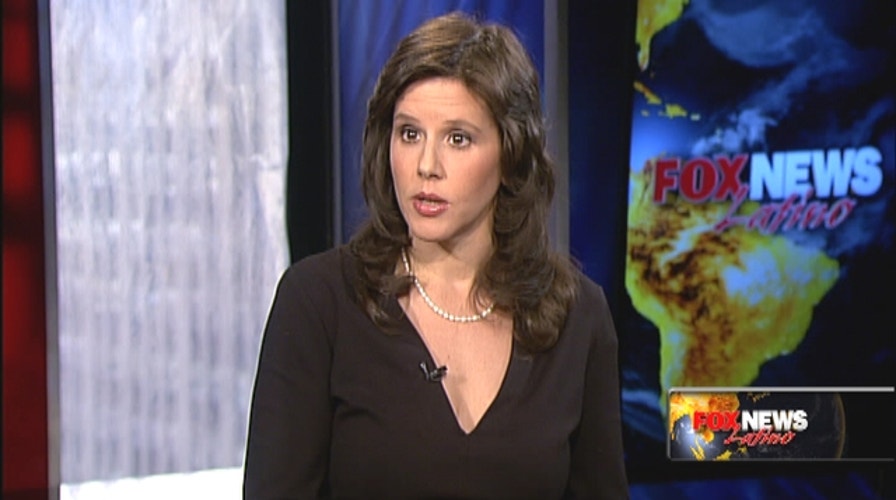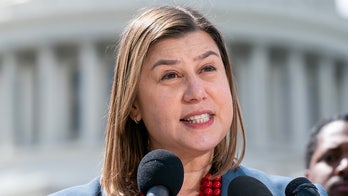Former Hugo Chavez Advisor, Eva Golinger, On The Unrest In Venezuela
Venezuelan-American Attorney Eva Golinger knew, advised, and was a friend of Venezuela’s former President Hugo Chavez. Here is Golinger’s take on what is happening in Venezuela.
She was born at Langley Air Force Base in Virginia – but it is Venezuela that gave her international notoriety.
Eva Golinger managed to penetrate the inner circle of then-Venezuelan President Hugo Chavez, and win a vital enough perch in it that he even took her abroad with him on a seven-country tour in 2010.
She praised Chavez, in books and essays, and became an adviser, applying her skills as a lawyer and writer to bolster claims that there was a conspiracy, involving the United States government and some of Venezuela’s wealthier citizens, to undermine and remove the socialist leader from power.
Now, a year after Chavez’s death, as Venezuela is mired in civil unrest that has seen more than 30 people die – many during anti-government protests – Golinger swats at criticism of Hugo Chavez and his successor, President Nicolas Maduro, with proprietary passion.
Hugo Chavez helped create a region where countries feel proud and no longer look to the United States feeling second-rate.
The protesters, she argues, do not reflect the views of the Venezuelan populace.
She characterizes the protesters the same way that the Maduro administration, and that of Chavez, has done so – a bunch of high-falutin’, spoiled people who, with the help of the United States and others, want to destabilize the government in order to keep socialism at bay and protect their privileges.
“This government of Nicolas Maduro enjoys the support of a majority, whether or not the opposition is willing to accept that,” said Golinger, 40, in an interview with Fox News Latino.
“The protesters have been a minority of people…concentrated in upper and middle class areas.”
Just look at one of the leaders of the protests, she said, referring to Leopoldo Lopez, whom Maduro bickered with on Twitter and had put in jail, where he remains. Lopez originally faced the possibility of being tried for terrorism and murder, in the words of Maduro officials, but apparently now may be prosecuted for inciting unrest and activities aimed at the removal of the president.
“Leopoldo Lopez went to boarding school in Princeton [New Jersey], and he graduated from Harvard,” Golinger said. “His friends also come from the upper classes, they’re on CNN, they have [the U.S. media’s] ear.”
Thor Halvorssen Mendoza, who is Lopez’s cousin and lives in New York, characterized Golinger as “a paid agent of the government of Venezuela.”
Golinger, he said, turns a blind eye to what many governments and international human rights organizations have reported and condemned as Venezuela’s institutional oppression of those who oppose the government.
“All of them have expressed their outrage over the fact that the Chavista government has shut down television stations in the dozens…that criticize the government.”
Lopez, he said, has been a target of Chavistas for a long time.
“He has been a victim of persecution for 10 years,” he said. “His rights are being violated.”
“For 14 years Chavismo, of which Maduro is the heir to Hugo Chavez, has been in control of the country and they have said repeatedly ‘We would never let go of power.’”
Many hold Maduro responsible for the social and economic problems that have led to weeks of unrest, mainly in the form of clashes between students and government security forces.
Protesters say they’ve been driven to the streets by the thousands to demand that something be done about Venezuela's inflation rate, which climbed to 57.3 percent in February, a high crime rate and a scarcity of basic goods, such as toilet paper. And now, many say Maduro is to blame for the heavy-handed treatment of the protesters who have taken to the streets around the country since February.
But Maduro, who was handpicked by Chavez to succeed him and implement his socialist plans, has his share of defenders. Golinger is one of the most vocal – she blogs in defense of Chavez's ideals and the Venezuelan government and gives interviews around the world plugging its stances.
Golinger, who edits an English-language edition of a Venezuelan publication, “Correo del Orinoco,” said that Leopoldo Lopez and the other protesters don’t respect that Maduro was democratically elected, and that they can work on a recall effort in a few years, or a change of leadership in the next election in 2019.
That’s why he’s sitting in jail, she said, “They’re charged with serious things, inciting violence, and subversion.”
Golinger’s defense of Maduro and Chavez, and pointed criticism of Lopez, incenses those who oppose the political system in Venezuela and the government’s handling of dissidents.
Golinger is seen by them as a kind of cult follower, blindly marching in lockstep with officials of the Maduro government, and the administration of Chavez, whom she described in an essay this year as “the Comandante of the XXI century” and added that “his value was immense,” and that he was “a soldier of the people, a giant of centuries.”
She says that while critics portrayed the late leader as a strongman, "Chavez had a big heart."
Chavez took her along with him on visits to various countries in 2010, including Syria, Iran and Libya, where she met those nation's leaders. Chavez noted her loyalty to his Bolivarian Revolution, anointing her "La novia de Venezuela," or "Venezuela's girlfriend."
A 2011 New York Times profile of Golinger called her “one of the most prominent fixtures of Venezuela’s expanding propaganda complex.” It described the English version of “Correo del Orinoco,” the publication she edits, as “Venezuela’s equivalent of the Cuban [government-controlled] newspaper Granma.”
Golinger balks at critics, saying she is not a puppet of Venezuelan government propaganda. What she says about their political system and Chavismo and Maduro “happen to be my views.”
The way her critics speak of her, she said, “shows a lack of tolerance and refusal to accept different [perspectives]."
She flatly dismisses the description of her as a paid mouthpiece for Venezuela.
“They say I’m a millionaire,” she said. “Most of my work was self-funded. I’ve worked as an attorney to support myself.”
Her work as adviser to Chavez, she said, was unpaid.
Golinger initially went to Venezuela in the 1990s to research ancestors from the paternal side of her mother’s family who went to Caracas from Spain.
She later married a Venezuelan singer who was that she sang in when she studied in Merida, in the Venezuelan Andes. But when he gave her an ultimatum and demanded she stop devoting time to promoting Hugo Chavez, she refused and the marriage ended.
Golinger said she is unfazed by the vitriol aimed at her.
“It’s been 10 years,” she said of the time she’s been a pariah to her detractors. “I get death threats. I had body guards.”
She said the way she sees it, the United States wants to impose its way on other countries.
“Venezuela is misunderstood, it’s unbelievably frustrating,” Golinger said. “It’s a different kind of democracy. It’s still a capitalist country that’s trying to implement socialist policies.”
Maduro, too, is distorted by critics, she said.
“Maduro’s only been in power for just a year, and it’s been such a disruptive time,” she said. “He always still reminds people that he didn’t ask for it, he took this job reluctantly.”
When she met him before he became president, and while Chavez was still alive, she asked him, for an article she was writing, “Who is Nicolas Maduro?”
“At that time he couldn’t respond as an individual, he said ‘We’re all sons of Chavez,’” she recalled, adding that Chavez had declared that he considered Maduro his successor. “There was fear [in Maduro] of what that implied.”
As for Cuba’s role in Venezuela, Golinger shoots down the criticism that the Castro brothers have made Venezuela their puppet nation and dictate things there.
“What’s beyond outrageous is the way the opposition tries to portray Cuba as interfering in Venezuela’s affairs,” she said. “Cuba has to be respected for its dignity, for the strength of their position confronting the U.S. blockade and aggression.”
Venezuela, she conceded, has its weaknesses.
“There are a lot of problems, in the justice system, there’s corruption, bureaucracy, no right to a speedy trial,” she said.
“Democracy is hard,” she said.
“But millions of Venezuelans now have a voice,” she said. “It’s a democratically elected government, and the people’s choice should be respected. Hugo Chavez helped create a region where countries feel proud and no longer look to the United States feeling second-rate.”
Video interview above conducted by Bryan Llenas.





